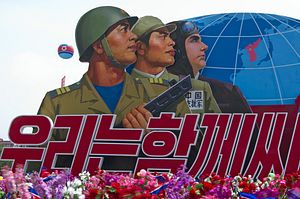North Korean leader Kim Jong-un did what he does best and made headlines around the world on Friday by ordering the military to be ready to use nuclear weapons at a moment’s notice. Following the UN Security Council’s vote Wednesday to hit Pyongyang with the strongest sanctions yet over its latest nuclear test and rocket launch, the dictator said the country’s nuclear warheads should be put on standby to defend the country from the “U.S. imperialists and their followers.” The heated rhetoric came a day after its military fired a number of short-range rockets into the sea off its coast.
Pyongyang has something of a habit of threatening nuclear war. Last September, it said it was primed to use nuclear weapons against the United States if it did not cease its “reckless hostile policy” toward North Korea, even though defense analysts doubt that it actually has the technology to hit America. When the UN passed a resolution in 2014 condemning egregious human rights violations inside the country, the regime similarly pulled the nuclear attack card.
On one level, the threats are an obvious warning to the international community to stop meddling in North Korean affairs — the latest sanctions add to an already considerable list of goods banned for export to the country and mandate inspections of all cargo in and out.
But the bluster might equally work as a message to the local population. By summoning the specter of a foreign enemy, the leadership can possibly bolster internal unity and dissipate potential murmurings of dissent. A spokesman for South Korea’s Ministry of Unification, which handles inter-Korean affairs, said the threats may have been aimed at boosting morale within the North, Reuters reported.
“The greatest threat is from within,” Daniel Pinkston, an international relations lecturer and former Korean linguist in the United States Air Force, told The Diplomat. “I think it is mostly directed at the domestic audience in North Korea.
North Korean propaganda regularly fixates on the threat of attack by the United States, which fought against the country in the Korean War. The regime has used the possibility of an American invasion to justify massive military spending while a significant portion of its population remains malnourished.
While the opaqueness of the country makes it difficult to judge Kim’s true popularity, some commentators have perceived hints of instability in his repeated purges of once close officials.
While Pinkston says the “message to the international audience is not credible,” the latest threats could be effective at maintaining the status quo at home.
“It is a good strategy to keep everyone afraid,” said Pinkston. “Helps you stay in power.”

































